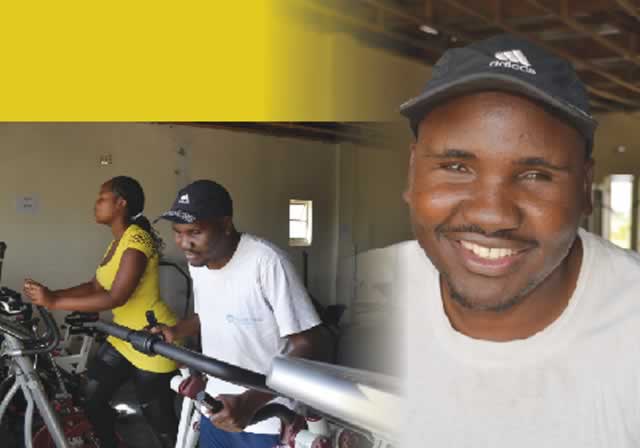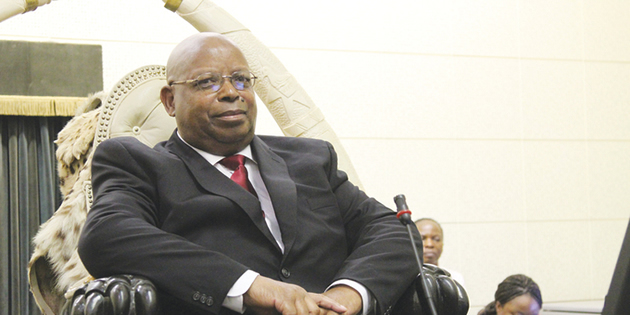Zooming in on Tafadzwa’s vision

 Chris Johnson Lunga Lifestyle Correspondent
Chris Johnson Lunga Lifestyle Correspondent
Imagine yourself being blind for a day and left alone to negotiate your way around your home. What and how would you feel? Would you not be overtaken by fear of falling over with one misstep or banging against a sharp object or table corner? These fears become amplified if you were placed in the middle of a busy street.
You would freeze totally because every step you take in any direction could mean certain death.
You would naturally be fearful of injury but what of the trauma of being trapped inside your own head, the never ending darkness in your head , that loneliness, that emptiness?
If you lost your vision after being sighted for 25 years, how would you cope? You could no longer see your face in the mirror, the clothes you are wearing, the food you eat, the wonderful world of colour around you. From a life of independence to one of total dependence through the initial panic reaction to one of sadness and depression. Would life be worth living then?
Tafadzwa Nyamuzihwa, suddenly found himself in a world of darkness, loneliness, a world of fear. After 25 years of being sighted, retinal detachment in both eyes left him hopelessly and totally blind. He was plunged into an abyss a fearful hole of only sound and touch.
His world fell apart, it was not worth living, a promising career cut short, normalcy had metamorphosised into something he couldn’t quite grasp .
He attempted suicide ….twice.
From being orphaned at birth, and now this. This world didn’t want him, never wanted him.
Regular counselling sessions convinced him to fight on, not be defeated. Four months later and step by step he began to embrace his new world, coming to terms with the emotional and physical challenges that it demanded.
Three months at the Braille Library in Harare, a rehabilitation centre for the blind and partially sighted, gave his life a new meaning. He learnt to overcome his fear and embrace his destiny. He was taught mobility, how to use the cane, read and write Braille. More importantly he had to relearn daily living skills; bathing, dressing and cooking.
Tafadzwa has an incomparable zest for life, a vigour, an insatiable desire to conquer everything that is thrown his way and to prove to himself that ‘the sky is not the limit, only your mind is the limit’. Now as a motivational speaker, inspiring multitudes on national radio and live audiences across the country, he often poses the question, “So you think you have problems? Lets change places”. Would you?
The world often recognises heroes as those who have performed great acts of bravery but some unsung heroes are quietly fighting battles that inspire many. Tafadzwa is one of the latter.
He is an achiever, inspired to inspire, who after the initial shock, accepted his fate in life and went on to do things most able bodied persons can only dream of.
Through Connect Zimbabwe, he appeared on a drama series on zbc. This exposure earned him a scholarship to study Project Management for the Disabled in India for one year.
Travelling to India alone and unaided was a challenge, but the experience strengthened him and his education over the 12 months was invaluable.
He was taught among many other things the use of computers, how to manage projects and presentations as a blind person. On his return, highly motivated he formed a Trust Foundation, whose main objective is to empower the blind. He is focusing on
Computer training
HIV and AIDS among the visually impaired
Equal employment opportunities
Sports and physical activities for the visually impaired
His list of achievements is awesome. In 2012 he was selected as a delegate representing people with disabilities to the UN conference in Nairobi, Kenya .
In 2014 he was awarded a scholarship by the Mandela Young African Leaders Fellowship to study Business and Entrepreneurship at North Western University in Chicago, USA. It was during this six-week-course that he attended a three day Presidential summit hosted by President Obama and the First Lady Michelle Obama.
In the same year Tafadzwa was also voted one of 20 Inspirational young Zimbabweans by the Herman Gmeiner SOS villages, out of 279 nominees based around the world. The award recognises outstanding individuals who were raised in the SOS villages and have gone on to distinguish themselves in their communities.
He was also voted into top 10 Outstanding young Zimbabweans for Humanitarian and Voluntary work by the Junior Chamber International.
Tafadzwa continues to inspire as a part time presenter with Star FM presenting Shining Star — an inspirational show encouraging perseverance against all odds.
Tafadzwa’s story goes beyond this one man, it brings to the fore not only one man’s personal battles but the private wars of so many others like him. We are sharply reminded of how society chooses to ignore the yearnings and needs of those with disabilities in almost all spheres of daily life. Tafadzwa has zeroed in on the world of sport and physical exercise.
Tafadzwa has a passion for sports, and blindness has not deterred him from being active. He was introduced to cricket while in India and he excelled at it and resolved to develop the game back home. His objective is to scout for talent and form a national association for blind cricketers.
Research by the American foundation for the blind (AFB) discovered that people with disabilities are more likely to be sedentary, have greater health problems, and have more barriers to participating in physical activity than the general population.
This therefore means they are more at risk of weight gain and the problems associated with it like the non-pandemic diseases that have become our biggest killers.
Tafadzwa’s experience in trying to join a local gym was disheartening and discouraging as he faced institutional discrimination. With no personal trainer in attendance to simply guide and assist, this escapade was an exercise in futility.
How many gyms out there are equipped to accommodate people with disabilities? How many gyms have trained personnel? Tafadzwa’s dream is to have a fitness centre for the visually impaired, but meanwhile he is working to conscientise gym owners nationwide to be accommodating and to force conformation through lobbying for equality of opportunity through legislation.
Exercise is as much about looking good as it is about feeling good.
With this feel good factor comes confidence, self esteem and more importantly good health. For the visually impaired basic fitness programmes should include functional exercises that strengthen and improve stability and balance. They can enjoy and participate in a wide range of activities, including running, weight training, football, cricket, basketball, swimming, yoga and aerobics.
Gyms need to
Afford concessionary rates to disabled people
Allow in at no cost a personal aid or allow guide dogs
Have personal trainers available to assist with familiarisation of training area and have available special programmes
Rearrange equipment to enable ample room for a blind person or wheel chair to manoeuvre
Accessible changing areas and toilet facilities
Tafadzwa’s story will continue to be written as this young man continues his inspirational journey. His hopes are that one day he will get a chance to meet President Mugabe and the first lady Dr Amai Mugabe. He wants to thank the first lady for her efforts in assisting and supporting those with disabilities and the disadvantaged in our society.








Comments